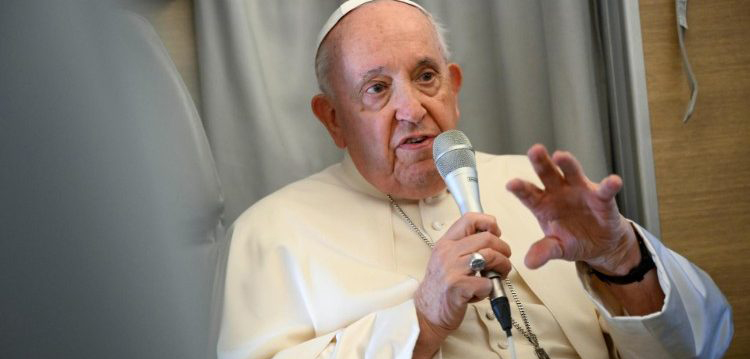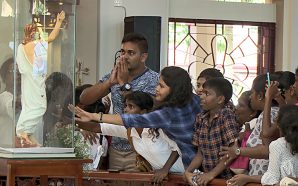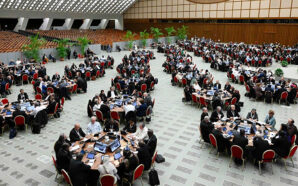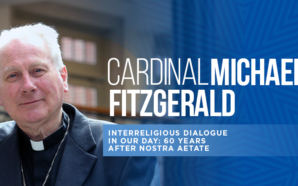Pope Francis held his traditional inflight press conference on Monday with journalists traveling with him on the papal plane returning to Rome from Mongolia.
He took questions on several topics, beginning with a question from a journalist from the host nation of his 43rd Apostolic Journey.
Here follows a working English transcription and translation of the press conference:
Jargalsaikhan Dambadarjaa (The Defacto Gazete):
Thank you very much, Your Holiness, for visiting Mongolia. My question is: what was your main objective with this visit and are you satisfied with the result achieved?
[Pope Francis]: The idea to visit Mongolia came to me whilst thinking about the small Catholic community. I make these trips to visit Catholic communities and also to enter into dialogue with the history and culture of the people, and with the mysticism of a people.
It is important that evangelisation is not conceived as proselytism. Proselytism always restricts. Pope Benedict said that faith does not grow by proselytism but by attraction. The proclamation of the Gospel enters into dialogue with culture. There is an evangelisation of culture and also an inculturation of the Gospel, because Christians also express their Christian values with the culture of their own people. This is the opposite of what religious colonisation would be.
For me, the journey was to get to know the people of Mongolia, to enter into dialogue with them, to receive their culture, and to accompany the Church on its journey with much respect for them and their culture. I am satisfied with the result.
Ulambadrakh Markhaakhuu (ULS Suld Tv)
Today, conflict between civilisations can only be resolved through dialogue, as you, Your Holiness, have said. Can Ulaanbaatar offer itself as a platform for an international dialogue between Europe and Asia?
I think so. You have something very interesting, which also favours this dialogue – I allow myself to call it the ‘third-neighbour mystique’. You think that Ulaanbaatar is the capital of a country furthest from the sea, and we can say that your land is between two great powers, Russia and China.
That is why your mystique is to try to dialogue even with your ‘third neighbours’: not out of contempt for these two, because you have good relations with both of them, but out of a yearning for universality, to show your values to the whole world, and also to receive from others their values in order to enter into dialogue.
It is curious that, throughout history, going out to seek other lands was often confused with colonialism, or with the idea of going in to dominate…always. Instead, you, with this mystique of the third neighbour, have the philosophy of going out to seek, but in order to dialogue. I really liked this expression of the third neighbour. It is a richness of yours.
Cristina Cabrejas (EFE)
Yesterday, you sent a message to the Chinese people, asking Catholics to be good citizens after the country’s authorities did not allow bishops to go to Mongolia. How are relations with China at the moment? And is there any news about Cardinal Zuppi’s trip to Beijing and the mission to Ukraine?
Cardinal Zuppi’s mission is a mission of peace that I assigned to him. And he made a plan to visit Moscow, Kyiv, the United States, and also Beijing. Cardinal Zuppi is a man of great dialogue and universal vision. His background includes his experience of working in Mozambique in the search for peace, and that’s why I sent him.
The relationship with China is very respectful, very respectful. I personally have great admiration for the Chinese people. The channels are very open – for the appointment of bishops there is a commission that has been working with the Chinese government and the Vatican for a long time. Then there are many, or rather there are some, Catholic priests or Catholic intellectuals who are often invited to Chinese universities to offer courses.
I think we need to move forward in the religious aspect to understand each other better and so that Chinese citizens do not think that the Church does not accept their culture and values and that the Church is dependent on another, foreign power.
This friendly path is well-followed by the Commission chaired by Cardinal Parolin: they are doing a good job, even on the Chinese side, relations are moving forward. I have great respect for the Chinese people.
Gerard O’Connell (America Magazine)
Your Holiness, relations between Vietnam and the Holy See are very positive right now, they have taken a remarkable step forward recently. Many Vietnamese Catholics are asking for you to visit them, as you did Mongolia. Is there a possibility now of visiting Vietnam? Is there an invitation from the government? And what other journeys are you planning?
Vietnam is one of the very good dialogue experiences that the Church has had in recent times. I would say it is like a mutual sympathy in dialogue. Both sides have had the good will to understand each other and look for ways to move forward; there have been problems, but in Vietnam I see that sooner or later problems are overcome.
A little while ago, with the President of Vietnam, we talked freely. I am very positive about the relationship with Vietnam; good work has been going on for years.
I remember four years ago, a group of Vietnamese parliamentarians came to visit: there was a nice dialogue with them, very respectful. When a culture is open, there is possibility for dialogue; if there is closure or suspicion, dialogue is very difficult. With Vietnam, the dialogue is open, with its pluses and minuses, but it is open and slowly moving forward. There have been some problems, but they have been resolved.
On the Vietnam journey, if I don’t go, John XXIV certainly will. There will certainly be [a trip], because it is a land that deserves to progress and that has my sympathy.
As far as other journeys, there is Marseille; and then there is one to a small country in Europe, and we are seeing if we can do it. But to tell the truth, for me going on a journey now is not as easy as it was in the beginning. There are limitations in walking and that limits me. But we’ll see.
Fausto Gasparroni (ANSA)
Your Holiness, your recent remarks to young Russian Catholics about “great mother Russia”, the legacy of figures such as Peter the Great and Catherine II have spurred some discussion. These comments have greatly irritated, for example, Ukrainians, have also had diplomatic consequences, and have been seen to some extent as almost an exaltation of Russian imperialism and a sort of endorsement even of Putin’s policies. I wanted to ask you: why did you feel the need to make these remarks, if you had reflected on the opportunity of making them, if you would repeat them? And also, just to make things clear. can you tell us what you think of imperialism and in particular of Russian imperialism?
Let’s talk about the context: it was a dialogue with young Russians. And at the end of the dialogue, I gave them a message, a message that I always repeat: to take responsibility for their legacy. First point: take on your legacy. I say the same thing everywhere. And with this in mind, I try to create a dialogue between grandparents and grandchildren: that the grandchildren take on their legacy. I say this everywhere, and that was the message.
A second point, to clarify what I mean with legacy: I mentioned the idea of great Russia, because the Russian legacy is very good; it is very beautiful. Think about the field of literature, of music, going back to Dostoevsky, who today speaks to us of mature humanism. (Russia) took charge this humanism, which developed in the arts and literature. This would be a second aspect when I spoke of legacy, wouldn’t it?
The third point, perhaps, wasn’t appropriate, but speaking of great Russia not so much in a geographical sense, but in a cultural sense, I remembered what we were taught at school: Peter I, Catherine II. And this third (point, ed.) came up, which maybe wasn’t quite right. I don’t know. Let the historians tell us. But it was an additional note that came to my mind because I had studied it at school.
What I told young Russians is to take charge of their legacy, to take on their legacy, which means not to buy it elsewhere. Take on your legacy. And what legacy did great Russia leave? Russian culture is of a great beauty, and depth, and should not be cancelled for political issues. There have been dark years in Russia, but its legacy has always remained intact.
Then you spoke about imperialism, and I wasn’t thinking of imperialism when I said that. I spoke of culture, and the transmission of culture is never imperial, never. It’s always dialogue, and I was talking about that.
It’s true that there are imperialisms that want to impose their ideology. I’ll stop here: when culture is distilled and turned into ideology, it’s poison. Culture is used, but distilled into ideology. We must distinguish the culture of a people from the ideologies that then appear from some philosopher, some politician of that people. And I say this for everyone, also for the Church.
Within the Church there are often ideologies, which separate the Church from the life that comes from the root and goes upwards. They separate the Church from the influence of the Holy Spirit.
An ideology is incapable of incarnation; it is only an idea. But when ideology gathers strength and becomes politics, it usually becomes a dictatorship, right? It becomes an incapacity to dialogue, to move forward with cultures. And imperialisms do this. Imperialism always consolidates starting from an ideology.
In the Church too we must distinguish doctrine from ideology: true doctrine is never ideological, never. It is rooted in God’s holy faithful people. Instead, ideology is detached from reality, detached from the people… I don’t know if I answered to your question.
Robert Messner (DPA)
Good morning. A question regarding your update of Laudato si’: can it be understood as a demonstration of sympathy with environmental activists like “The Last Generation”, which organize highly demonstrative protests? Maybe there is also a message in this update for young activists taking to the streets?
Generally speaking, I don’t touch on these extremists. But young people are concerned. A good Italian scientist – we had a meeting at the Academy (of Sciences, ed.) – delivered a good speech and concluded saying: “I wouldn’t want my grand-daughter, who was born yesterday, to live in such an ugly world in thirty years’ time.”
Young people think about the future. And in that sense, I like that they fight well. But when ideology is involved, or political pressure is involved or it is used for this, it fails.
My Apostolic Exhortation will be released on the feastday of Saint Francis, 4 October, and it is a review of what has happened since the COP in Paris, which has perhaps been the most fruitful to date. There is some news about some COPs and about some things that haven’t been resolved yet, and there is an urgency to solve them. It is not as big as the Laudato si’, but is a continuation of Laudato si’ on new things, and is also an analysis of the situation.
Etienne Loraillère (KTO TV)
You would like a synodal Church in Mongolia and throughout the world. The October assembly is already fruit of the work of the people of God. How can the baptized from all over the world be involved in this phase? How can ideological polarization be avoided? And will the participants be able to speak and share publicly what they are experiencing to allow for walking together with them? Or will the whole process be private?
You spoke about how to avoid ideological pressure. There is no place for ideology in the Synod, as it is a different dynamic. The Synod is about dialogue: among the baptized, among members of the Church, on the life of the Church, on dialogue with the world, on the problems that affect humanity today.
But when one thinks (of undertaking) an ideological path, the Synod is over. There is no place for ideology at the Synod, there is space for dialogue. Talking with each other, as brothers and sisters, and discussing the doctrine of the Church. Moving forward.
Then I want to underscore that synodality is not my invention: it was Saint Paul VI. When the Second Vatican Council ended, he realized that in the West the Church had lost the synodal dimension; the Eastern Church still has it. For this reason, he created the Secretariat of the Synod of Bishops, which in these sixty years has carried forward reflection in a synodal way as an ongoing progress, moving forward.
When it was the fiftieth anniversary of this decision of Saint Paul VI, I signed and published a document on what the Synod is and how it has moved forward. And now it has gone forward; it has matured more, and for this reason I thought it would be very good to have a Synod on synodality, which is not a trend; it is an ancient reality; the Eastern Church has always had it.
But how do we live synodality, and live it as Christians, as I said before, without giving in to ideologies.
On the process of the assembly: there is one thing that we must safeguard, the synodal atmosphere. This is not a television show where you talk about everything. No. There is a religious moment; there is a moment of religious exchange.
In the synodal introductions, they will speak for three to four minutes each: three (speeches, ed.) and then there will be three to four minutes of silence for prayer. Then three more, and prayer. Without this spirit of prayer there is no synodality; it becomes politics and parliamentarianism. The Synod is not a parliament.
Regarding the privacy of discussions: there is a department headed by Dr. Ruffini, who is here, and who will issue press releases regarding the Synod progress. In a Synod, it is necessary to safeguard religiosity and safeguard the freedom of those who speak. For this there will be a commission, chaired by Dr. Ruffini, which will provide information on the progress of the Synod.
Antonio PELAYO (Vida Nueva)
Holy Father, you have just spoken about the Synod and we all agree with you that this Synod has generated much curiosity and much interest. Unfortunately, it has also brought forth much criticism from Catholic realities. I refer (now) to a book with a prologue by Cardinal Burke who says that the Synod is a pandora’s box from which all calamities for the Church will come. What do you think of this position? Do you think it will be overcome by reality or could (this view) influence the Synod?
I don’t know if I’ve already said this before. A few months ago, I called a Carmelite. “How are the nuns doing, Mother Superior?” She was a non-Italian Carmelite. And the prioress answered me. And she finally said to me: “Your Holiness, we are afraid with this Synod.” “Now what’s going on?” I said jokingly. “Do you want to send a sister to the Synod?” “No, we are afraid you are going to change doctrine.” And this is what she was saying, she had this idea…
But if you go to the root of these ideas, you will find ideologies. Always, when one wants to detach from the path of communion in the Church, what always pulls it apart is ideology. And they accuse the Church of this or that, but they never make an accusation of what is true: (it is made up of) sinners. They never speak of sin … They defend a “doctrine”, a doctrine like distilled water that has no taste and is not true Catholic doctrine, that is, in the Creed. And that very often scandalizes. How scandalous is the idea that God became flesh, that God became Man, that Our Lady kept her virginity? This scandalizes.
Cindy Wooden (CNS)
Good morning Your Holiness, I would like to follow up on my French colleague’s question about the Synod and information. So many lay faithful have given so much time, prayer, involvement in speaking, listening. They want to know what’s happening during the Synod, the Assembly. And you spoke of your experience of the Synod on religious, during which some people had said, “don’t put this…”, “You can’t say this…” We journalists don’t even have access to the Assembly and the general sessions. How can we be sure that what we are given as “gruel” [It: pappa] is true? Is there not a possibility of being a little more open with journalists?
But [it is] very open, dear; it is very open! There is a commission chaired by [Paolo] Ruffini [Prefect of the Vatican’s Dicastery for Communication, ed.] that will give the news every day, but more open, I don’t know, more open, I don’t know…
It’s good that this commission will be very respectful of everyone’s speeches and will try not to chitter-chatter [It: chiacchiericcio], but to say the things precisely on the synodal progress, which are constructive for the Church. If you want, if someone wants the news to be, “This person has taken it out on that person for this or that reason,” that is political gossip.
The committee does not have an easy task, in saying: “Today the reflection went this way, it went like this,” and to convey the ecclesial spirit, not the political one. A parliament is different from a synod. Do not forget that the protagonist of the Synod is the Holy Spirit. And how can this be transmitted? This is why the ecclesial progress must be conveyed.
Vincenzo Romeo (RAI TG 2)
Good morning, Your Holiness. You are the Pope of the peripheries, and the peripheries, especially in Italy, are suffering greatly. We have had some worrying episodes of violence, of degradation… For example, near Naples, a parish priest, Don [Maurizio] Patriciello [parish pastor in Caivano, ed.] even invited you to go [there], then to Palermo [in Sicily]. What can be done? You visited the “villas miserias” in Buenos Aires, so you have experience with this. Our Prime Minister also visited one of these peripheries. There is a lot of discussion. What can be done, what can both the Church and the institutions of the State do to overcome this degradation and make the peripheries truly part of a country?
You speak about the peripheries, like the slums: you have to go forward, you have to go there and work there, as was done in Buenos Aires by the priests who worked there – a team of priests with an Auxiliary Bishop at the head – and you work there. We must be open to this, governments must be open, all the governments of the world, but there are peripheries that are tragic.
I come back to a scandalous periphery that people try to cover up: that of the Rohingya. The Rohingya suffer. They are not Christians; they are Muslims, but they suffer because they have been converted to a periphery; they have been driven out. We have to see the different types of peripheries and also learn that the periphery is where human reality is more evident and less sophisticated – [there are also, ed.] bad moments, I don’t want to idealize – but it is better perceived.
A philosopher once said something that struck me greatly: “Reality is best understood from the peripheries.” We must talk to the peripheries, and governments must do real social justice, real social justice, with the different social peripheries and also with the ideological peripheries, to get them to talk, because many times it is some exquisite ideological periphery that provokes the social peripheries. The world of the peripheries is not easy. Thank you.
This is a working translation and transcription. Words and expressions in parenthesis are provided for clarity.
Thanks to Vatican News where this article originally appeared.








